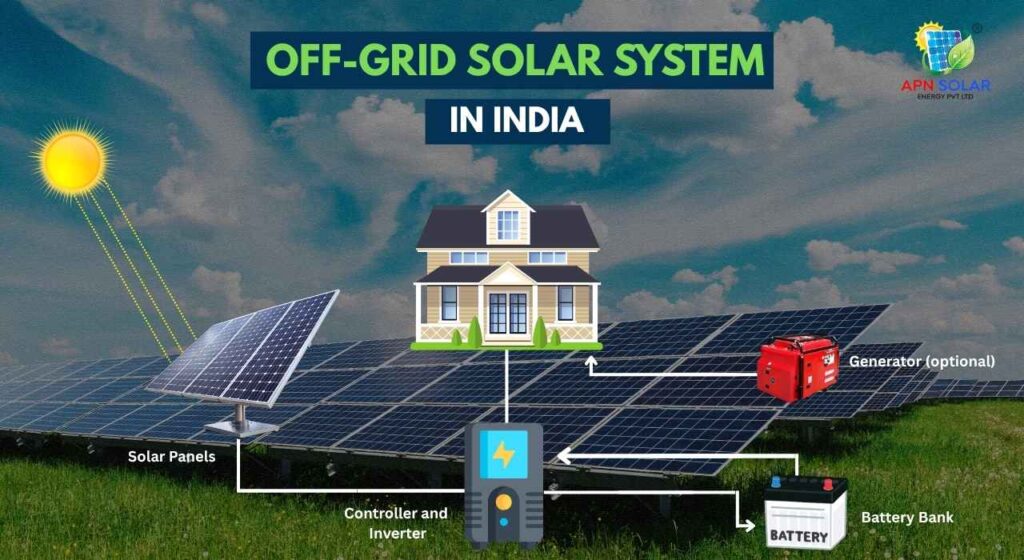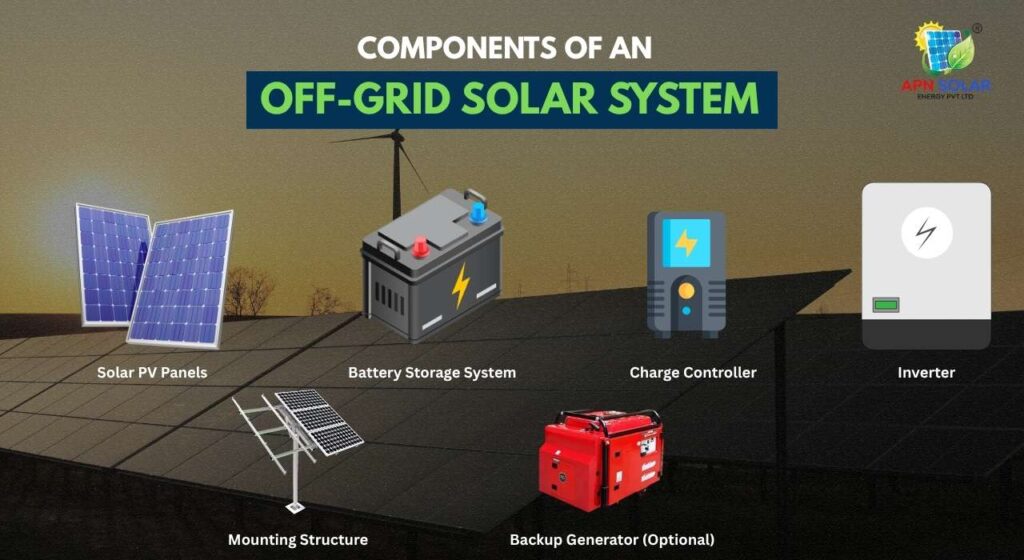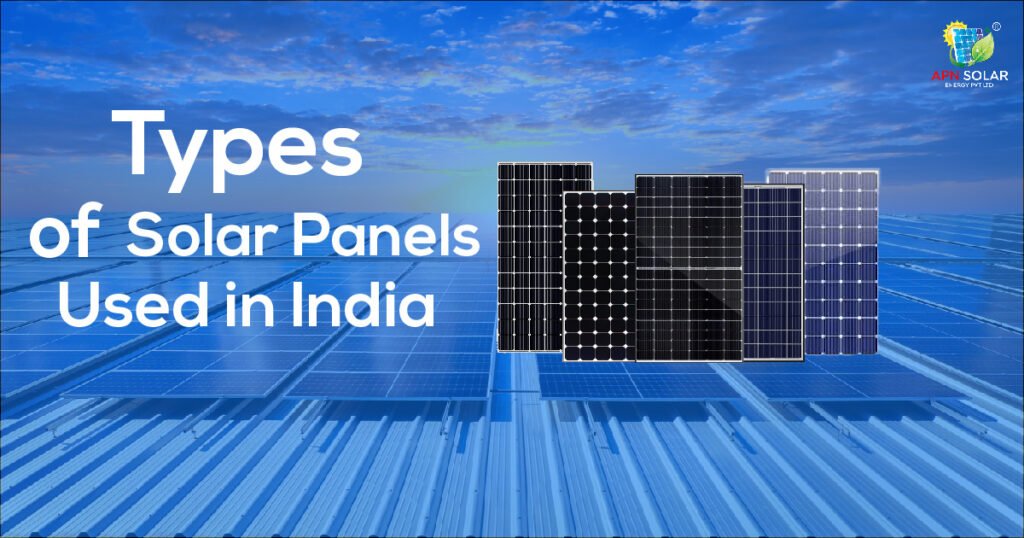As power demands grow and grid reliability becomes increasingly uncertain, many Indian homeowners and businesses are turning to off grid solar systems as a practical and sustainable energy solution. These systems operate independently of the utility grid, using solar panels and batteries to generate and store electricity providing a reliable solar backup system even in the most remote areas.
With rising electricity costs and limited grid access in many parts of rural and semi-urban India, off grid solar is emerging as a key enabler of energy independence. It empowers individuals and communities to take control of their power supply, reduce reliance on diesel generators, and contribute to a cleaner environment.
APN Solar, a trusted name in the Indian solar industry, offers professionally designed off grid systems tailored to your energy needs, ensuring long-term performance, savings, and resilience.
What is an Off Grid Solar System?
An off grid solar system is a standalone solar power setup that functions completely independently from the main electricity grid. Unlike grid-connected systems, it generates electricity using solar panels and stores excess energy in batteries for use when sunlight is unavailable. This allows homes, farms, and businesses to have a reliable power supply without relying on the utility grid.
In simple terms, the off grid solar system meaning is a self-sufficient energy solution that ensures continuous power through solar energy off grid systems. These systems are ideal for remote areas, rural locations, or places with frequent power outages where grid electricity is unreliable or non-existent.
How Does an Off Grid Solar System Work?
An off grid solar system provides electricity independently by generating, storing, and managing power on-site without any connection to the utility grid. During the day, solar panels convert sunlight into electricity, which is either used immediately or stored in batteries for later use. This stored energy ensures a continuous power supply during the night or on cloudy days when solar generation is low or unavailable.
The system then converts the stored energy into a usable form to power household appliances and equipment reliably. Because it operates completely on its own, the system continuously balances energy generation, storage, and consumption to avoid shortages. This self-sufficiency makes off grid solar systems especially valuable in remote or rural areas where grid power is unreliable or unavailable.
To increase reliability, many off grid setups also include backup energy sources, such as generators, which can provide power during extended periods of low sunlight or increased demand. Overall, an off grid solar system works by maintaining a seamless cycle of energy production, storage, and consumption, delivering consistent, uninterrupted electricity without relying on the grid.
Components of an Off Grid Solar System
An off grid system relies on several essential components working together to generate, store, and deliver electricity independently of the utility grid. Understanding these components helps you appreciate how the system provides reliable solar power backup for homes and businesses.
Solar PV Panels
Off grid solar panels capture sunlight and convert it into direct current (DC) electricity. These panels are the primary source of energy generation and are sized based on your power needs and available roof or land space. If you’re exploring which type of panel is right for you, our detailed guide on the types of solar panels in India can help you make an informed decision.
Battery Storage System
The battery storage system stores excess energy generated by the solar panels during the day. This stored power is crucial for providing electricity during the night or cloudy days. Batteries can be lead-acid or lithium-ion types, with lithium-ion batteries generally offering longer life and better efficiency.
Charge Controller
The charge controller regulates the flow of electricity from the solar panels to the batteries. It prevents overcharging and deep discharging of the battery bank, ensuring battery longevity and system safety.
Inverter
An inverter converts the DC electricity stored in batteries into alternating current (AC) electricity. AC power is the standard used by most household appliances and electronics, making the inverter a critical component for usability.
Mounting Structure
The mounting structure securely holds the solar panels in place, typically on rooftops or ground-mounted frames. Proper mounting ensures optimal orientation and tilt for maximum solar exposure.
Backup Generator (Optional)
For extended periods of low sunlight or higher energy demands, an optional backup generator can supplement the off grid solar system, ensuring uninterrupted power supply.
Each of these components plays a vital role in making the off grid solar system a dependable source of clean, renewable energy, offering true energy independence and a reliable solar power backup solution.
Off Grid Solar System Design Considerations
Designing an efficient off grid solar system requires careful planning and analysis to ensure reliable power supply tailored to your specific needs. Whether for a residential home or a commercial facility, several key factors must be considered.
Load Calculation: Understanding Your Energy Needs
The first step in the design process is accurately calculating your load requirements the total electricity consumption of all appliances and devices you intend to power. This includes lighting, fans, refrigerators, pumps, and any specialized equipment. Proper load calculation helps determine the right size of the solar panels and battery capacity needed to meet your daily energy demands without shortages.
Energy Autonomy Days: Planning for Power Security
Another critical design factor is the number of energy autonomy days, which refers to how many days the system should provide power without any solar input, such as during prolonged cloudy weather. A higher autonomy period means a larger battery bank, ensuring uninterrupted power during adverse conditions.
Panel Orientation and Placement
Optimizing panel orientation and tilt is essential for maximizing solar energy capture. Panels should ideally face true south (in the northern hemisphere) at an angle matching your location’s latitude. Proper positioning reduces energy losses and increases overall system efficiency.
Residential vs Commercial Off Grid Design
Residential off grid systems typically focus on powering daily household essentials and small appliances, often requiring smaller solar arrays and battery banks. In contrast, commercial or industrial off grid setups demand larger, scalable systems designed to support heavier and more varied loads. They may also integrate hybrid solutions or backup generators to ensure consistent power availability.
APN Solar’s Off Grid Design Approach
At APN Solar, we adopt a customized off grid design approach, combining detailed site assessments, load analysis, and the latest solar technology to deliver solutions optimized for each client. Our team ensures your system is designed for maximum efficiency, reliability, and cost-effectiveness.
For a comprehensive understanding of installation steps and best practices, check out our detailed Solar Panel Installation Guide.
Off Grid Solar System Cost in India (2025 Update)
Understanding the off grid solar system cost is essential for planning your investment in clean, independent energy. The overall cost depends on system size, battery capacity, and the quality of components used, including solar installation cost and battery storage cost.
Below is a pricing overview for common off grid solar system sizes available in India in 2025:
| System Size (kW) | Ideal Application | Approximate Cost (INR) |
| 1 kW | Small homes, basic lighting | ₹90,000 – ₹1,10,000 |
| 3 kW | Medium homes, essential appliances | ₹2,70,000 – ₹3,20,000 |
| 5 kW | Large homes, small offices | ₹4,00,000 – ₹5,00,000 |
| 10 kW | Commercial setups, farms | ₹7,00,000 – ₹9,00,000 |
Factors Influencing Cost
- System Sizing: Larger systems require more solar panels and batteries, increasing the price. Proper load calculation ensures you invest in the right system size.
- Battery Storage Cost: Battery type (lead-acid vs lithium-ion) significantly affects cost. Lithium-ion batteries offer longer life but come at a premium.
- Installation and Maintenance: Professional installation ensures safety and system longevity, adding to upfront costs but reducing long-term issues.
Return on Investment (ROI) and Subsidies
Investing in an off grid solar system typically leads to substantial savings by eliminating or drastically reducing electricity bills and diesel generator fuel costs. Over time, the system pays for itself, especially with the decreasing prices of solar technology.
Additionally, various central and state government schemes in India offer subsidies and incentives for solar installations, including off grid systems. These subsidies can significantly reduce the upfront investment and improve ROI.
Off Grid vs On Grid Solar System: Which One is Better for You?
Choosing between an off grid and an on grid solar system depends largely on your location, energy needs, and goals.
An off grid solar system provides complete energy independence by generating and storing all your electricity, making it ideal for remote areas or places with unreliable grid access. In contrast, an on grid system works alongside the utility grid, allowing you to use solar power when available and draw from the grid as needed. This setup often benefits from net metering, reducing your electricity bills.
Here’s a quick comparison to help you decide:
| Feature | Off Grid Solar System | On Grid Solar System |
| Grid Connection | No | Yes |
| Energy Storage | Requires batteries | Usually no batteries needed |
| Power During Outages | Yes, with battery backup | No, unless paired with batteries |
| Net Metering | Not available | Available |
| Ideal For | Remote or rural areas | Urban/suburban with reliable grid |
For a detailed comparison and to explore which system suits your needs best, read our full guide on On Grid vs Off Grid Solar System. Ultimately, your choice depends on whether you prioritize total solar independence or integration with the existing grid infrastructure.
Benefits of Off Grid Solar Systems
Off grid solar systems offer a range of advantages, especially for users seeking reliable and independent energy solutions. Here are the key benefits:
- Energy Self-Sufficiency
Off grid solar systems provide complete energy independence by generating and storing power on-site. This means you are not reliant on the utility grid or external power sources. - Uninterrupted Power Supply
With built-in battery storage, these systems deliver continuous electricity, even during grid outages, night time, or cloudy weather, ensuring your home or business never faces unexpected blackouts. - No Electricity Bills
Since you generate and use your own solar power, you eliminate monthly electricity bills, resulting in significant long-term savings. - Ideal for Rural Electrification
Off grid solar solutions are perfect for remote or rural areas where grid connectivity is limited or non-existent, providing a reliable and clean energy source. - Environmentally Friendly
Utilizing solar energy reduces dependence on fossil fuels, cutting carbon emissions and contributing to a cleaner, greener planet. - Scalable and Flexible
These systems can be customized to match your energy needs, whether for a small household or a larger commercial setup. You can also choose between monocrystalline and polycrystalline solar panels depending on your efficiency and budget requirements.
Off Grid Solar Power Systems for Homes vs Commercial Use
Off grid solar power systems can be tailored to meet the specific energy needs of both residential and commercial users. Understanding these differences helps in choosing the right system for your requirements.
Residential Off Grid Systems
An off grid home solar system is designed to support daily household electricity loads such as lighting, fans, refrigerators, and small appliances. Typically sized between 1 kW to 5 kW, these systems prioritize energy efficiency and uninterrupted power supply for essential home needs.
Residential systems focus on providing comfort and convenience, ensuring that families in rural or off-grid areas have access to reliable electricity without dependence on the utility grid. Battery storage capacity is planned to cover night time usage and occasional cloudy days, maintaining a seamless energy flow.
Commercial/Industrial Off Grid Systems
For larger energy demands, an off grid solar power plant designed for commercial or industrial use offers scalable solutions. These systems can range from 10 kW to several megawatts, supporting heavy-duty machinery, office equipment, lighting, and other operational needs.
Commercial off grid systems often incorporate advanced monitoring and management tools to optimize energy use and ensure consistent power supply. Businesses in remote locations, agricultural operations, and manufacturing units benefit significantly from these autonomous solar solutions.
Why Choose APN Solar for Your Off Grid Solar Needs?
When it comes to reliable and efficient off grid solar solutions, APN Solar is recognized as the best solar company in India. With extensive experience and a strong track record, APN Solar delivers customized systems designed to meet the unique energy needs of homes, businesses, and industries across the country.
Our certified professionals ensure top-quality installation using premium components, backed by solid warranties for long-term performance and peace of mind. Whether you are located in a bustling city or a remote village, APN Solar’s nationwide presence ensures prompt support and service wherever you are.
With a commitment to designing tailored off grid solar systems, APN Solar helps you achieve true energy independence. As a trusted solar brand in India, we prioritize customer satisfaction, system efficiency, and sustainability in every project.
Frequently Asked Questions
1. What is an off grid solar system?
An off grid solar system is a standalone solar power setup that operates independently from the utility grid. It generates electricity through solar panels, stores energy in batteries, and supplies power directly to your home or business without relying on external electricity sources.
2. How much does an off grid solar system cost in India?
The cost varies based on system size, battery capacity, and components used. Typically, prices range from ₹90,000 for small 1 kW systems to ₹9,00,000 or more for large commercial setups. Additional factors like installation and battery type affect the overall price.
3. Can I run my entire home on off grid solar?
Yes, an off grid solar system can be designed to power your entire home, including lighting, appliances, and other electrical equipment. Proper load calculation and sufficient battery storage are essential to ensure uninterrupted power supply.
4. Is off grid better than on grid?
Both systems have their benefits depending on your location and energy needs. Off grid solar offers complete energy independence and is ideal for remote areas, while on grid solar systems are connected to the utility grid and can benefit from net metering.
5. What are the main components of an off grid solar system?
The key components include solar PV panels, a battery storage system (lead-acid or lithium-ion), a charge controller, an inverter, and a mounting structure. Backup generators can also be part of the system for added reliability.
6. How long do batteries last in off grid systems?
Battery lifespan varies by type and usage. Lead-acid batteries typically last 3-5 years, while lithium-ion batteries can last 8-15 years with proper maintenance.
7. Can I start a solar franchise in off grid solar areas?
Yes, starting a solar franchise in off grid areas is a promising business opportunity. These regions have high demand for independent power solutions, and franchising with an experienced provider offers training, support, and access to quality off grid solar products.




